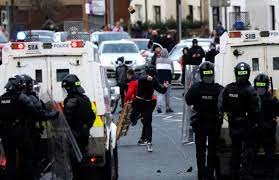
Authorities in Northern Ireland sought to restore calm after Protestant and Catholic youths in Belfast hurled bricks, fireworks and gasoline bombs at police and each other.
Daily Current Affairs Quiz 2021
It was the worst mayhem in a week of street violence in the region, where Britain’s exit from the European Union has unsettled an uneasy political balance.
The chaotic scenes have stirred memories of decades of Catholic-Protestant conflict, known as “The Troubles”. A 1998 peace deal ended large-scale violence but did not resolve Northern Ireland’s deep-rooted tensions.
Geographically, Northern Ireland is part of Ireland. Politically, it’s part of the United Kingdom.
Ireland, long dominated by its bigger neighbour, broke free about 100 years ago after centuries of colonisation and an uneasy union. Twenty-six of its 32 counties became an independent, Roman Catholic-majority country. Six counties in the north, which have a Protestant majority, stayed British.
Northern Ireland’s Catholic minority experienced discrimination in jobs, housing and other areas in the Protestant-run state. In the 1960s, a Catholic civil rights movement demanded change, but faced a harsh response from the government and police.
The 1998 Good Friday accord saw the paramilitaries lay down their arms and established a Catholic-Protestant power-sharing government for Northern Ireland.
The question of Northern Ireland’s ultimate status was deferred: it would remain British as long as that was the majority’s wish, but a future referendum on reunification was not ruled out.





